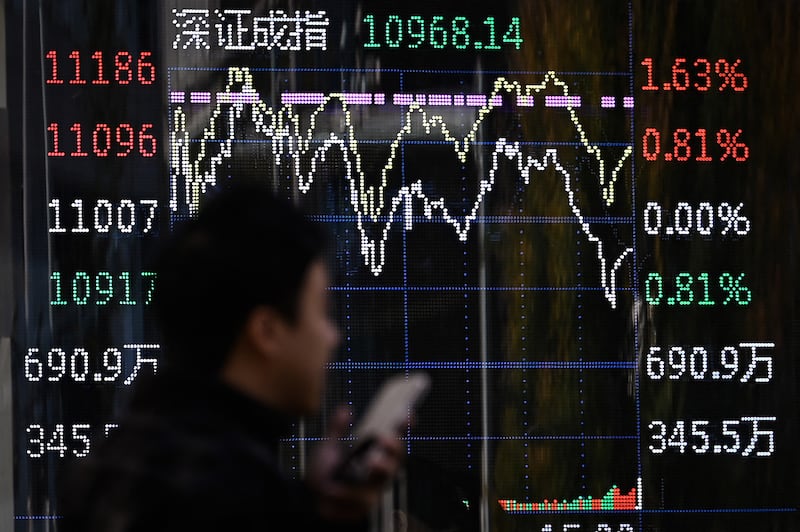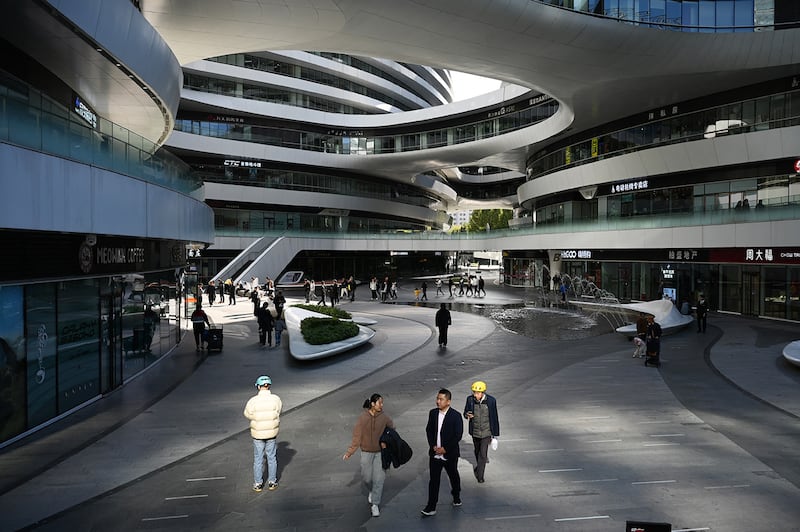Qian Lang and Lucie Lo for RFA Mandarin2024.11.08
Read this story in Chinese.
When Chinese President Xi Jinping sent a congratulatory message to Donald Trump on his election victory this week, he warned that both countries stand to “lose from confrontation,” amid growing concerns that a Trump administration could be further bad news for China’s flagging economy.
“Xi Jinping noted that history tells us that both countries stand to gain from cooperation and lose from confrontation,” China’s Foreign Ministry said in a statement on its website, citing Xi.
“A China-U.S. relationship with stable, healthy and sustainable development serves the common interests of the two countries and meets the expectations of the international community,” it paraphrased Xi as saying.
“It is hoped that the two sides will, in the principles of mutual respect, peaceful coexistence and win-win cooperation, enhance dialogue and communication, properly manage differences, expand mutually beneficial cooperation, and find the right way for China and the United States to get along with each other in the new era to the benefit of the two countries and the world,” the statement said.
It said China’s Vice President Han Zheng sent a congratulatory message to J.D. Vance on his election as U.S. vice president on the same day.
Trump’s victory has sparked concern in China, where many expect the next president to be tougher on China than his predecessor, particularly on trade and economic issues, with repercussions for an already struggling economy.
“Trump’s re-election as U.S. president won’t improve relations with China, but will continue sanctions and the trade war by increasing tariffs,” veteran political journalist Gao Yu said, citing a sharp fall in Chinese stock markets on the news of Trump’s victory.
“The sharp fall in Chinese markets were part of a psychological reaction from the people,” Gao said. “China may talk a good fight, but actually it’s very worried about a Trump presidency.”
Tariffs
Rana Mitter, director of the University of Oxford China Centre, said the Sino-U.S. relationship will likely go through a turbulent period if Trump follows through on his pledge to impose 60% tariffs on Chinese imports.
“This is obviously a very, very high level of tariff or import tax to place on goods,” Mitter told Radio Free Asia a recent interview. “And since it’s coming at a moment when China’s economy is vulnerable, it’s likely to be regarded as the first stage in an extremely detailed and probably quite rigorous negotiation between the two sides about resetting the trade relationship.”

“China … is also keen to try and make sure that its currently rather sluggish economy which is not currently operating at full strength, is not further made vulnerable,” he said.
But he said negotiations with China would likely come as part of the Trump administration’s attempt to rework its trade relations with much of the rest of the world, including the European Union and other economies.
Mitter dismissed recent speculation that the Chinese government would alter its expected fiscal stimulus package in response to the U.S. election result, however.
“The primary motivation I think for the fiscal stimulus within China is domestic,” he said. “The fear that consumer demand simply isn’t picking up enough to actually play the role that it needs to in revitalizing the economy.”
But he added: “Policies which create economic uncertainty within China, for instance tariffs, might make that situation more delicate and vulnerable.”
‘Anti-Chinese Communist Party flavor’
A Chinese researcher who gave only the surname Jia for fear of reprisals said Trump’s re-election will definitely have a negative impact on the Chinese economy.
“Trump’s China policy has a clear anti-Chinese Communist Party flavor, which will exacerbate economic and political chaos in China,” Jia said. “The Chinese economy is already sluggish, and the re-intensification of the trade war will further hit exporters, and could lead to more bankruptcies and unemployment.”

A retired Chinese official who gave only the surname Tang for fear of reprisals said Trump is seen by many Chinese people as different from traditional politicians, and acts more like a “trader.”
“The ultimate goal is to see who will bring the most benefits to the country, and to the world,” Tang said. “That’s what the American people expect.”
He said Trump’s victory was unlikely to make the Sino-U.S. relationship any worse, however.
“Sino-U.S. relations have never really eased,” Tang said. “The conflict is rooted in the different ideologies of the two countries, which won’t change with the arrival of a new president.”
He said the less confrontational approach taken in the era of late supreme leader Deng Xiaoping wasn’t genuine detente, only a matter of the Chinese Communist Party biding its time.
“It’s impossible for there to be detente, because the problems are bone-deep,” he said.
Translated by Luisetta Mudie. Edited by Roseanne Gerin.

